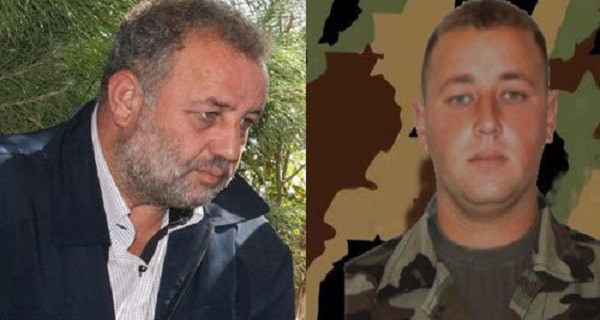Bekaa revenge killing inflames tribal tensions
Nicholas Blanford/Now Lebanon/May 26/16
The apparent murder of the nephew of a fugitive Arsal sheikh by the father of a Lebanese soldier executed by Nusra militants could lead to further violence in the region. Lebanese soldiers of the airborne division check vehicles in the east Lebanon village of Arsal, near the Syrian border on February 4, 2013. A convoy of Lebanese army Humvees mounted with .50 caliber machine guns trundled slowly through the streets of Taraya village in the Bekaa Valley, watched closely by local residents. The army presence Wednesday afternoon appeared to be a show of resolve in the wake of the killing on Tuesday of Hussein Hujeiri, the nephew of fugitive cleric Sheikh Mustafa Hujeiri, aka “Abu Taqiyah”. The young Hujeiri’s bullet-riddled body was found on the grave of Mohammed Hamieh, a soldier who was captured from Arsal and executed by Jabhat al-Nusra in 2014. The soldier’s father, Maarouf Hamieh, holds Abu Taqiyah and former Arsal mayor Ali Hujeiri personally responsible for his son’s death and has vowed revenge against them on numerous occasions.
Those familiar with the Hamieh clan, and Maarouf Hamieh himself, knew that this promise of vengeance was not to be taken lightly. Indeed, he implicitly claimed responsibility for Hussein’s Hujeiri’s death by stating on Tuesday that it was “just the beginning” and that he would not rest until he had taken the head of Abu Taqiyah. The revenge killing follows a pattern of tribal justice in the Bekaa Valley, a fact of life – and death – widely recognized and understood by the residents of the region. The writ of the Lebanese state is traditionally weak in the northern Bekaa where loyalty to family, clan and tribe is paramount.
The Hujeiri clan in Arsal also follows these strict tribal customs and will be looking to exact revenge for the death of one of their own. According to a resident in Arsal, when news of Hussein Hujeiri’s murder broke, Abu Taqiyah’s followers set up checkpoints in the town. “They were looking for a Shiite, any Shiite, to kill in revenge,” the resident said.
Another resident said that while the checkpoints were taken down after a couple of hours, Abu Taqiyah was implicitly signaling that it is the militants that control Arsal, not the Lebanese state. Abu Taqiyah is currently being tried in absentia by a military court for his role in the attack on Arsal in August 2014 when a combined force of some 700 Islamic State and Jabhat al-Nusra militants over-ran the town. He is accused of facilitating the abduction of 35 soldiers and policemen by the extremist groups. Last week, Military Investigative Judge Najat Abu Shaqra demanded the death penalty for 107 militants allegedly involved in the 2014 battle for Arsal, including Abu Taqiyah.
The Lebanese army surrounds Arsal with a series of fortified hilltop outposts and checkpoints but has no permanent presence in the town, where militants from Jabhat al-Nusra and the Islamic State hold sway. The army has stepped up its operational tempo in the Arsal area in recent weeks, staging a number of snatch raids inside the town to arrest militants. On April 30, a Lebanese army Puma helicopter dropped a pair of 500lb bombs onto a Jabhat al-Nusra bunker complex in Wadi Awayni, nine kilometers south east of Arsal, destroying the facility and killing several militants. Abu Taqiyah has vowed a counter-revenge for the death of his nephew but it is unclear if he has the means to carry out such a retaliation while he and his followers are effectively bottled up inside Arsal.
Maarouf Hamieh is believed to still be in Taraya, although he has moved into the village center away from his isolated house on the outskirts. It remains to be seen whether he will be arrested or not. The army in the past two years has shown a willingness to raid villages in the Bekaa to catch car thieves, drug dealers and other wanted criminals as part of the nationwide “security plan” that helped bring calm to the traditionally warring neighborhoods of Jabal Mohsen and Bab Tebbaneh in Tripoli. But assuming Maarouf Hamieh was responsible for the death of Hussein Hujeiri, his action will have won widespread sympathy and understanding from the Shiite tribes of the Bekaa and his own Hamieh clan will doubtless stand by him. It is unlikely the army will attempt to arrest him directly and it may require some quiet dialogue away from the media glare to resolve the issue.
Will the killing of Hussein Hamieh further enflame sectarian tensions in the Bekaa? Probably not. The feud between the Hamieh and Hujeiri families is not sectarian in nature but rooted in tribal codes of honor and revenge. Indeed, in the wake of his son’s death in 2014 and funeral in December 2015, Maarouf Hamieh urged calm among the Shiites of the Bekaa and to avoid falling into a sectarian trap by taking revenge against Syrian refugees, almost all of whom are Sunni in the Bekaa. Hamieh’s focus is on the Hujeiri family and the sect to which it belongs is immaterial as far as he is concerned. This is a tale of Bekaa revenge that has yet to reach the final chapter.
**Nicholas Blanford is Beirut correspondent for The Christian Science Monitor and Nonresident Senior Fellow of the Middle East Peace and Security Initiative at the Atlantic Council’s Brent Scowcroft Center on International Security


















